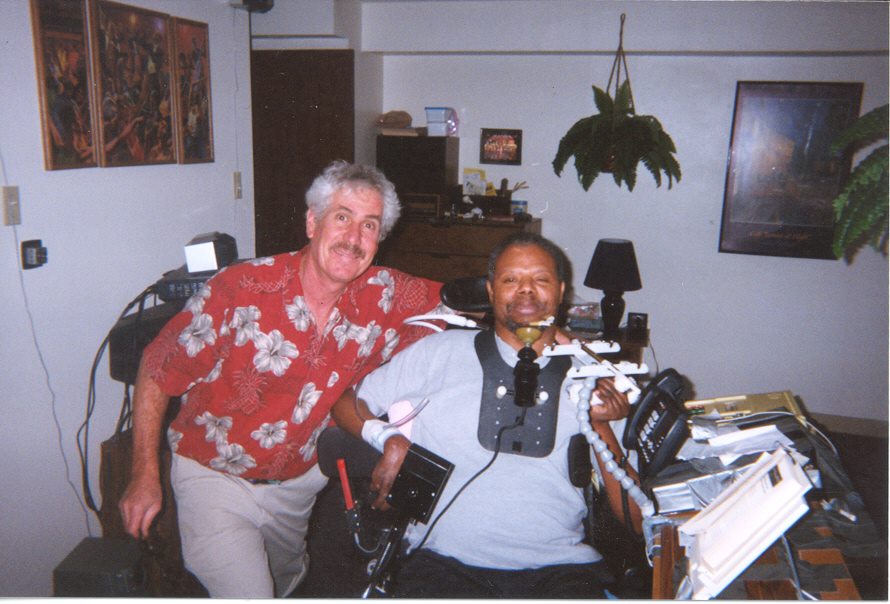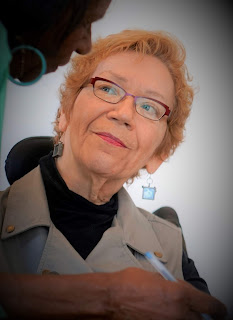The State of Tennessee’s Appeal of the Lane Decision Should Be Withdrawn.
"... it is clear that states are not actually seeking greater sovereignty, they want more money. "
By: Deborah Cunningham
EDITOR'S NOTE: Looking back twenty years ago today, the long-time director of the Memphis Center for Independent Living put her two cents into the Lane case. Back in 2003, the Civil Rights of the ADA were in danger. Deborah gives a great rebuttal here, and concludes very personally. It is clear the issues twenty years ago still reverberate in our state.
7/12/2003
Legal pundits call it “sovereign immunity,” but basically it is the principle that rulers are exempt. The un-elected Attorney General of Tennessee is appealing his assertion that our state is exempt from protecting the Civil Liberties of Tennesseans with disabilities to the US Supreme Court. Tennessee v. Lane (No. 02-1667) will be heard in the upcoming session by the Supreme Court if Summers does not withdraw our state’s appeal. Although citizens of Tennessee may feel most passionate about their Constitutional Rights, the state of Tennessee has opted to challenge those rights of Americans with Disabilities and assert the authority of a single state over the most important civil rights of individuals. Title II of the 1990 Americans with Disabilities Act requires that state and local government make programs and services “readily accessible and usable by individuals with disabilities.” Those governmental institutions may be the polling place, the courtroom, city hall and the state capitol building. And the Constitutional Rights that states are obligated to protect may be as essential as: voting, due process and equal protections.
1. Paul Summers continues the reputation for southern bigotry through the appeal of Lane.
The Attorney General of Tennessee asserts that Congress did not have the authority to require states to act to ensure these basic civil liberties. A similar challenge was made to the 1964 Civil Rights Act, claiming in Katzenbach v. McClung (Ollies BBQ) that a local BBQ shop was not covered by the “Interstate Commerce Clause” and thus exempt from Congressional authority to integrate.

Now as Americans look back, Congressional authority was necessary to achieve racial integration in the light of states resistance to altering the privileged system. The same is true for the civil rights of persons with disabilities. States are historically the most abusive of institutions; many states had sterilization programs directed at people with disabilities. The United States eugenics movement justified the sterilization, institutionalization, prohibition of marriage and preclusion of immigration of people with disabilities. The later passage of the discriminatory “Jim Crow” and immigration laws were based on eugenicists distorted viewpoint. In 1927, the U.S. Supreme Court legalized forced sterilization of people with disabilities in
Buck vs. Bell.
The Constitutional Rights of people with disabilities are endangered by state actions. Without Congresses authority to make and enforce laws essential to the inclusion and integration of people with disabilities our nation will take a leap backward to a time when disability was hidden, isolated and locked away. The step backward is easy to see, because this nation is nearing the fiftieth anniversary of the Brown v. Board decision. Although equality was clearly an individual’s Constitutional Right, US states could redefine separate as equal. Long before the Supreme Court reversed the ugly discrimination validated by Plessey v. Ferguson, it was clear that states did not protect equality, even separate equality and Paul Summers continues this legacy with his endangerment of the rights of Americans with disabilities.
2. Tennessee’s Appeal to the Supreme Court endangers valid civil rights of people with disabilities.
Americans support the ADA. Nearly nine out of ten (87%), of those who are aware of the ADA, support and approve of the Americans with Disabilities Act. [A Louis Harris and Associates survey 1999]. When President George H.W. Bush signed the 1990 Americans with Disability Act he stated:
And now I sign legislation, which takes a sledgehammer to another wall, one which has for too many generations separated Americans with disabilities from the freedom they could glimpse, but not grasp. Once again, we rejoice as this barrier falls for claiming together we will not accept, we will not excuse, we will not tolerate discrimination in America.
Although most Americans support the landmark civil rights legislation, the ADA did not start out with reasonable enforcement on a federal level. Mouth magazine reported to its readers on the results of a five-month investigation into the U.S. Department of Justice and its enforcement of disability rights law. The report showed that in six years of enforcement, the Disability Rights Section of the DOJ had brought only one ADA case to trial and judgment, and between January 1, 1994, and December 31, 1997, the DOJ opened 6,339 ADA cases, filing suit in four. 5,525 cases were still open, unresolved, on January 1, 1998.
Even with a weak record of enforcement following the ADA, the situation of Americans with disabilities has significantly improved as reported by Dr. I. King Jordan, the first deaf president of Gallaudet University:
Certainly, life before the ADA was rampant with physical and social barriers that prevented disabled people from making even rudimentary decisions. Many were trained in sheltered workshops, or warehoused by families and educational systems embarrassed by their very existence, and convinced they had little potential for success. [Dr. I. King Jordan, “Colleges Can Do Even More for People With Disabilities,” The Chronicle of Higher Education, Section 2 (June 15, 2001).
The Congress’ express purpose was equal access to government by all citizens. The priorities established by Title II make access to government the top priority of state and local entities. Additionally, since the ADA was signed, there are some critical facts that could be added to the record of discrimination by state governments.
Voting: In 1998 approximately 20,000 polling places were not accessible. Integration: States have ignored the US Supreme Court’s 1999 Olmstead decision. More than two-thirds of the states have not even developed a plan for implementation of Olmstead.
Due Process: The evidence Congress had when it passed the ADA showed that 76% of state-owned buildings did not offer accessible programs and services. George Lane in 1996 could not access a courtroom in Tennessee because he uses a wheelchair and sued the state for denying him due process. Attorney General Paul Summers used this incident to allege that Tennessee does not need to protect some citizen’s Constitutional Rights.
Transportation: In 1989, one-third (36%) of the national bus fleet was accessible. ... projections indicate that by 2002, the national bus fleet will be 100 percent lift/ramp-equipped. [Rosalyn M. Simon, “Status of Transportation Accessibility in the United States: Impact of the Americans with Disabilities Act,” in Proceedings of Seminar L Held at the Planning and Transportation Research and Computation European Transport Forum, Brunel University, England § 3.1 (Sept. 2-6, 1996)].
3. Tennessee does not advance “states rights” with the Lane Appeal
The concept of sovereign immunity should not be resolved at the expense of citizens’ valid civil liberties. The legal issues may ignore that real people are involved and the real issues are ultimately not simply legal, but moral. The concept of sovereign immunity is even further removed from the lives of Americans today because individual US states do not exercise dominion over the lives of citizens. Federal Highway funds normally dictate a state’s transportation plans, Medicare significantly impacts states health-care procedures, Medicaid funds determine long-term care policy and National Education policy directs US states schooling.
The fact is that states work to get federal funding with one hand and push federal control away with the other. States could easily claim greater sovereignty by turning down federal funds and making their own rules or even canceling programs altogether; however, it is clear that states are not actually seeking greater sovereignty, they want more money.
Tennessee rather than working to become more “sovereign” is becoming more and more dependent on federal money coming into the state. I am familiar with this states failed long-term care policy because I have worked to help citizens live independently for the past 20 years. Our state almost exclusively funnels long-term care funding to nursing homes and other institutions, the most expensive and least desirable form of long-term care.
.jpg)
Seven years ago the Comptroller of the Treasury warned us that Tennessee faced a crisis in long-term care funding and as more Tennesseans are forced into institutions for long-term care, the Federal Medicaid funds that now are huge, will continue to grow. The 1997 Tennessee comptroller's report mentioned the success of Wisconsin, Oregon and Washington. Between 1979 and 1995, Oregon cut long-term care costs by $400 million. Between 1982 and 1992, the report declared, the total number of nursing home beds in those three states dwindled and home and community services increased. [W. R. Snodgrass, Comptroller of the Treasury; Long-Term Care of Tennessee's Elderly, Oct. 1997]
For many years I have assisted with the help of Memphis ADAPT and the Memphis Center For Independent Living more than a dozen people with disabilities to leave the state of Tennessee in order to receive minimal assistance (bathing, dressing, wheelchair transfers) they need to live in other U.S. states that offer home and community services as an alternative to nursing homes.
Without exception the Tennesseans with disabilities wanted to live and work in their own communities, they still do. I would like to remind Mr. Summers that forcing us to seek asylum outside of our own state in order to receive basic assistance is not only cruel and inhumane but also morally unconscionable. Unfortunately, Mr. Summers’ conscience appears to be unaware and undisturbed by citizens with disabilities in Tennessee who seek civil rights protection from discrimination.










.jpg)













